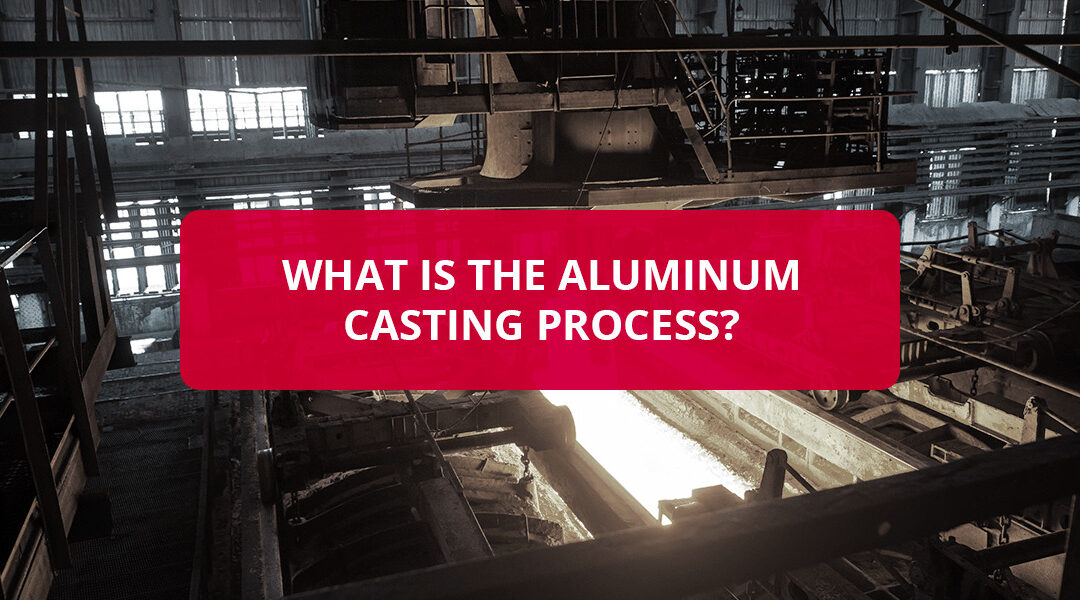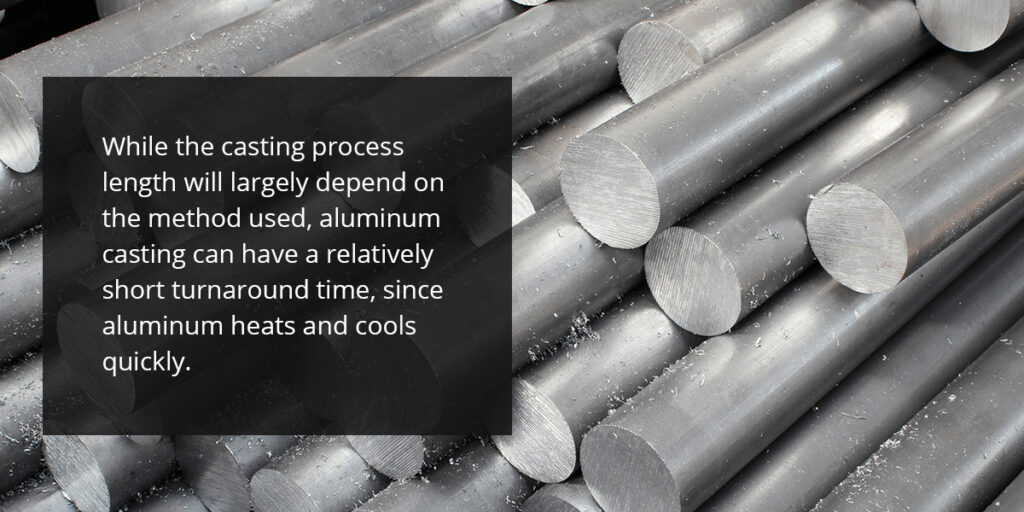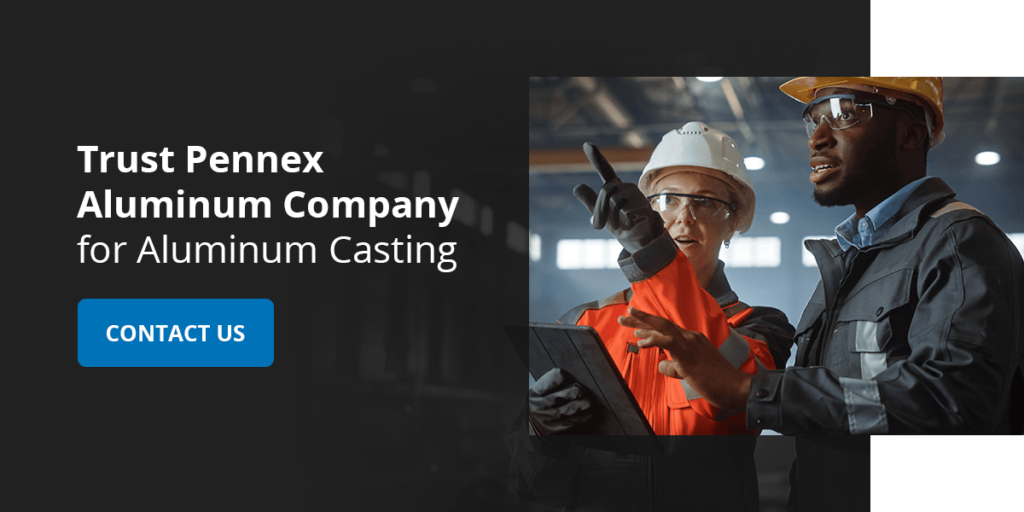Casting is a widely used process to create parts from various metals, and up to 90% of manufactured products contain cast metal. Aluminum has become one of the most commonly used casting metals because of its versatility and presence in everything from cellphones and soda cans to airplanes and kitchen appliances. Aluminum lends itself to many casting processes, allowing manufacturers to produce repeatable products at high volume.
Aluminum casts can range in size considerably, depending on the method used to produce the parts. Learn more about the aluminum casting process, the industries that use cast aluminum and how aluminum casting can be beneficial.
What Is Aluminum Casting?
Aluminum casting is a metalworking method that involves heating aluminum to a molten state and pouring it into a mold. Manufacturers use this process to create a wide range of products, from cookware to airplane parts, making cast aluminum one of the most versatile and durable materials used today. There are many ways to cast aluminum, though three of the most common molding methods include permanent mold casting, die casting and sand casting.
Permanent Mold Casting
Permanent molds are one of the most popular methods for casting aluminum because the molds are reusable. A manufacturer pours molten aluminum into the mold, which usually consists of iron or steel. Then, allowing it to set ascertains the aluminum is solid enough to hold its new shape. Once the casting solidifies, removing the mold ensures the aluminum can cool without deforming. After taking the casting out of the mold, the process is immediately repeatable.
Because of high repeatability and the need for little preparation between castings, permanent molds are ideal for producing high product volumes. The molds are consistent and offer quick cooling rates compared to other methods.
Die Casting
The die-casting process also relies on reusable molds, though in this case, it involves injecting the molten aluminum into the mold. The high-pressure injection allows for a better surface finish and more detailed casting than other methods. However, trapped air pockets can compromise durability. Die casting is also ideal for high-volume production, though the castings must be relatively small and straightforward.
Because die molds often consist of high-grade steel, they tend to last longer than other types of casting molds. Die casting also tends to be more costly compared to other casting options.
Sand Casting
Sand casting is a bit different than other casting methods. This process consists of packing moist sand and clay around a pattern to create the imprint or mold of a product. Then, a manufacturer pours molten aluminum into the cavity in the sand. After the product solidifies, a worker removes it from the mold and grinds off any tabs. Though dimensional accuracy is low and the surface finish isn’t as smooth in the sand as it is in other methods, it’s possible to cast almost anything using sand.
Costs tend to be lower when casting with sand, and many aluminum cast manufacturers can reuse the sand for future casts. Reusing sand helps make the process more environmentally friendly, as it reduces the materials that go into landfills.
How Long Is the Aluminum Casting Process?
While the casting process length will largely depend on the method used, aluminum casting can have a relatively short turnaround time, since aluminum heats and cools quickly. Techniques like permanent molds and die casting also allow for short production times. Compared to other alloy metals, it’s possible to produce aluminum castings at a much faster rate.
For a more accurate estimate of how long your product’s casting would take, be sure to contact a professional aluminum casting company.
Benefits of Aluminum Casting
Regardless of the casting method used, aluminum cast products offer numerous benefits. Aluminum’s physical and chemical properties of aluminum offer some of the following advantages when cast.
- Versatility: Because aluminum is a malleable material, it’s possible to cast it into nearly any shape or pattern. This flexibility makes it a desirable material in so many industries.
- Lightweight: Aluminum is feather-light, which makes it more effective in many applications than other metals like iron or steel.
- Durability: Though it’s extremely lightweight, aluminum possesses high strength and durability. This property makes aluminum long-lasting.
- Recyclable: Aluminum is easily recyclable. At Pennex Aluminum Company, our products contain more than 80% recycled aluminum.
What Industries Use the Aluminum Casting Process?
Aluminum’s qualities make it suitable for countless applications in a wide range of industries. Here are a few sectors that rely on aluminum.
- Construction: Construction companies extensively use aluminum when building airports and high-rises because they provide sturdy support frames for large panes of glass. In electrical lines and power grids, aluminum is conductive and makes for lightweight cables.
- Aerospace: Modern transport planes and space shuttles largely consist of aluminum because it’s light enough to escape Earth’s atmosphere, yet sturdy enough to protect the contents. You’ll find this metal primarily in aircraft frames and wings.
- Food and beverage: Aluminum dominates the food and beverage industry. In addition to keeping a can’s contents sealed and intact, aluminum is highly recyclable and the surface is printable, making it a practical choice for drink and canned goods companies.
- Technology and appliances: Aluminum is a crucial component in most laptops, TVs, smartphones and other electronics. Home appliances made with aluminum have a highly aesthetic appearance and are equally functional. Refrigerators feature aluminum because it has thermal properties.
- Automotive: Aluminum vehicle frames, engines and body panels make for lightweight vehicles, thus improving fuel economy and reducing carbon footprints. Additionally, much of aluminum automotive scrap is recyclable, making it an environmentally friendly material in the automotive world.
Trust Pennex Aluminum Company for Aluminum Casting
With two casting facilities, Pennex Aluminum Company has the materials and equipment to produce more than 200 million pounds of cast aluminum in a year. We can produce a range of billet sizes to meet various needs in different industries and applications. Our other services include extruded aluminum and precision-engineered aluminum components. To learn more about our products and services, contact our team today!


